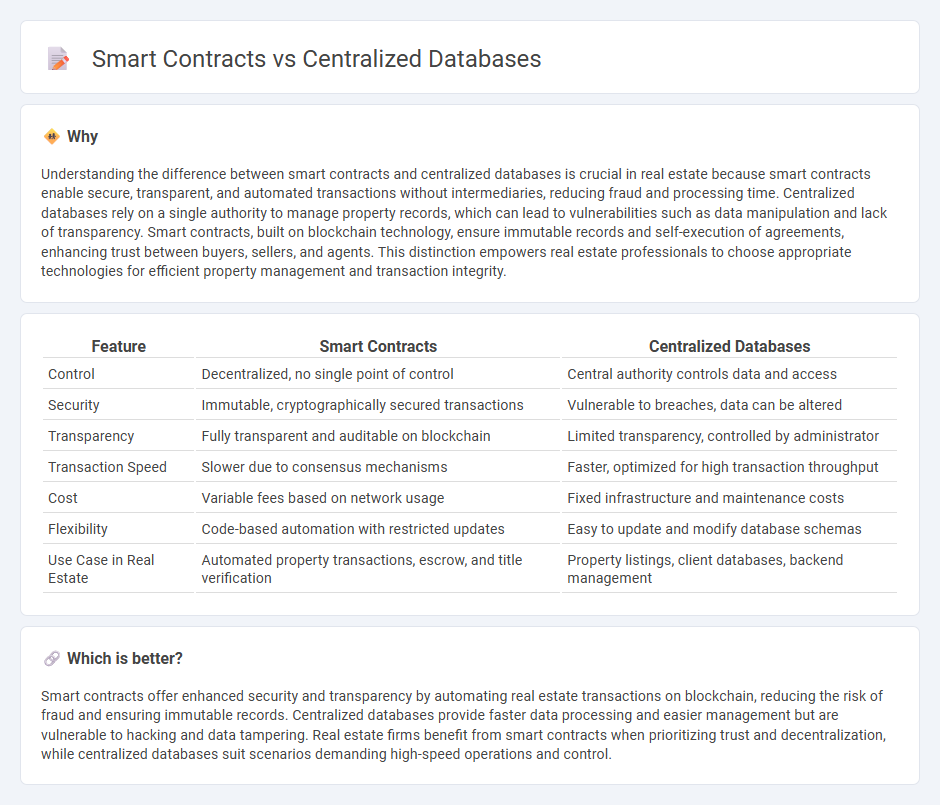
Smart contracts automate property transactions through blockchain technology, ensuring transparency, immutability, and reduced need for intermediaries in real estate processes. Centralized databases rely on traditional servers controlled by single entities, which can introduce risks such as data manipulation and slower verification times. Discover how smart contracts are revolutionizing real estate management compared to conventional centralized systems.
Why it is important
Understanding the difference between smart contracts and centralized databases is crucial in real estate because smart contracts enable secure, transparent, and automated transactions without intermediaries, reducing fraud and processing time. Centralized databases rely on a single authority to manage property records, which can lead to vulnerabilities such as data manipulation and lack of transparency. Smart contracts, built on blockchain technology, ensure immutable records and self-execution of agreements, enhancing trust between buyers, sellers, and agents. This distinction empowers real estate professionals to choose appropriate technologies for efficient property management and transaction integrity.
Comparison Table
| Feature | Smart Contracts | Centralized Databases |
|---|---|---|
| Control | Decentralized, no single point of control | Central authority controls data and access |
| Security | Immutable, cryptographically secured transactions | Vulnerable to breaches, data can be altered |
| Transparency | Fully transparent and auditable on blockchain | Limited transparency, controlled by administrator |
| Transaction Speed | Slower due to consensus mechanisms | Faster, optimized for high transaction throughput |
| Cost | Variable fees based on network usage | Fixed infrastructure and maintenance costs |
| Flexibility | Code-based automation with restricted updates | Easy to update and modify database schemas |
| Use Case in Real Estate | Automated property transactions, escrow, and title verification | Property listings, client databases, backend management |
Which is better?
Smart contracts offer enhanced security and transparency by automating real estate transactions on blockchain, reducing the risk of fraud and ensuring immutable records. Centralized databases provide faster data processing and easier management but are vulnerable to hacking and data tampering. Real estate firms benefit from smart contracts when prioritizing trust and decentralization, while centralized databases suit scenarios demanding high-speed operations and control.
Connection
Smart contracts automate and enforce real estate transactions by executing predefined agreements on blockchain networks, ensuring transparency and reducing fraud. Centralized databases store comprehensive property records and transaction histories, providing authoritative data that smart contracts reference for validation and execution. This integration enhances transaction efficiency by combining immutable contract enforcement with reliable, centralized property information.
Key Terms
Intermediaries
Centralized databases rely heavily on intermediaries to manage and validate transactions, creating potential bottlenecks and single points of failure. Smart contracts operate on decentralized blockchain networks, eliminating the need for intermediaries by automating trust through code execution. Explore how removing intermediaries enhances transparency and efficiency in digital transactions.
Transparency
Centralized databases store data in a single location controlled by one entity, which can limit transparency due to restricted access and potential data manipulation. Smart contracts operate on decentralized blockchain networks, enabling automatic execution of agreements with full public auditability and tamper-proof records. Explore how smart contracts enhance transparency compared to traditional centralized systems for more insight.
Automation
Centralized databases streamline data management through a single access point, enabling efficient automation of workflows within controlled environments. Smart contracts leverage blockchain technology to execute automated, self-enforcing agreements without intermediaries, ensuring transparency and immutability. Explore the distinct automation capabilities of centralized databases and smart contracts to optimize your operational strategy.
Source and External Links
Centralized Database - Wikipedia - A centralized database is stored, maintained, and accessed from a single location, often used by organizations to ensure data integrity and consistency.
Database Management: Centralized vs. Decentralized - This article compares centralized and decentralized databases, highlighting the advantages of centralized systems, such as improved security and reduced costs.
10 Benefits of Having a Centralised Single Database - Discusses the benefits of a centralized database, including accuracy, consistency, and efficiency in data management.
 dowidth.com
dowidth.com